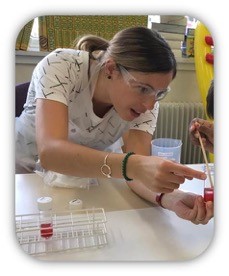Pegasus DNA Code Breakers – 3rd successful outreach event at local primary school
A group of volunteers from the Dunn School of Pathology completed their 2017-2018 outreach series at Pegasus Primary School in Oxford with a 3rd event that took place on the 13th of June. The session, aimed at inspiring potential young scientists of the future, was entitled “DNA – the code of life” and covered the basics of DNA and genetics.
The outreach activity aimed at teaching Year 5 children was about what living organisms have in common and about DNA as the code for our genetic information. The children and scientists discussed how cells are the building blocks of life. They discussed the properties of cells, how DNA makes up the instructions that are unique to each one of us and considered what makes us different from other living organisms as well. This stimulated a discussion about the properties of DNA, as well as the scientists that discovered the unique double-helix structure of DNA, which included female scientist Rosalind Franklin who missed out on the Nobel Prize at the time.
The pupils were then split into groups of four to get hands-on scientific experience; they were able to extract DNA from raspberries with the help and guidance of Dunn School scientists. This practical workstation was, for most students, the highlight of the outreach activity. They also applied their recently acquired knowledge and imagination during a second workstation on genetic engineering in plants to create new forms of wheat that could survive under different climate conditions. During the wrap-up session, one of the school children mentioned: “I wasn’t very motivated by science at the beginning of the school year, but after these events I think that I would like to become a scientist one day”.
At the end of the activity, the scientists answered several questions from the keen pupils about the application of genetic engineering, DNA and what working in a lab entails. The children’s curiosity, ability to follow the volunteers’ instructions and overall knowledge impressed both scientists and teachers alike. The whole class also had the chance to review the concepts learnt throughout the series of three outreach events, which covered (amongst others) the use of microscopes to look at cells, different types of bacteria such as cholera, and the discovery of penicillin to kill bacteria – which they simulated by popping a bacteria-looking balloon, while revealing the DNA inside the bacteria. Teachers Rebecca Blackwell and Edmund Helliwell highlighted the excitement of the children in carrying out their first ever practical experiment, and how the three events had been cleverly linked together providing a good overview on how exciting science and discoveries can be.
The enthusiastic volunteers that helped ensure the success of this outreach event were: Professor Shona Murphy, Dr Rebecca Moore (Sattentau), Dr Alison Murphy (Maloy), Dr Anna Caballe (Raff), Giulia Pilla (Tang), Lucia Rampazzo (Esashi), Ines Alvarez Rodrigo (Raff) and Rhian Ford (Tang). The series of three outreach events were planned and coordinated by Dr Lindsay Stimson, Dr Rachel Exley and Prof Christoph Tang, together with the teachers and staff at Pegasus Primary School. This final outreach session was also in keeping with the aims of the series of inspiring primary school pupils into science, teaching and demonstrating to them the wonders and excitement of discovery, and allowing them to meet real scientists.
Written by Dr Anna Caballe (@caballe_anna) and Lisa Gartenmann

